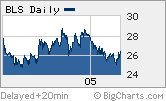 |
| Flying solo: Analysts think BellSouth's stock could outperform other telecoms since it won't have merger distractions to deal with. |
|
| More about telecom takeovers
|
|
|
|
|
|
|
NEW YORK (CNN/Money) � You need directory assistance to help keep track of all the mergers taking place in telecom these days.
Hello, operator? Is SBC buying Nextel? No? That's Sprint? Thanks. And wait. Can you tell me what company MCI agreed to merge with?
Well, there's one telecom that's easy to keep track of. BellSouth has largely remained out of the merger frenzy that's swept through telecom during the past few years. As a result, it might be the best bet in the industry.
Sure, BellSouth has done some maneuvering. Cingular Wireless (which BellSouth owns 40 percent of) bought AT&T Wireless last year. But that's nothing compared to what its rivals are taking on.
SBC Communications (Research), BellSouth's majority partner in Cingular, is also buying Ma Bell herself, plain old AT&T (Research). SBC will be adding about $7 billion in net debt and a declining long-distance business in the process.
Assuming Verizon's quest -- not Qwest -- for MCI succeeds, Verizon will also have to deal with some growing pains. Plus, Qwest (Research) has already forced Verizon (Research) to offer more for MCI (Research) than it originally wanted to pay.
Finally, Sprint (Research) and Nextel (Research) have the unenviable task of managing a single company with two wireless networks running on different technologies.
Standing alone
Meanwhile, BellSouth (Research) will be sitting pretty with little in the way of merger integration headaches. And analysts say that's just how the conservative BellSouth likes it.
"In general, BellSouth has always been the odd man out. They stepped aside when others were consolidating and that served them well," said Wayne Homren, an analyst with Parker/Hunter. "They were able to concentrate on operational measures and organic growth when others got distracted."
John Hodulik, an analyst with UBS points out in a recent report that BellSouth's stock has done much better than its peers during two other recent waves of telecom consolidation.
According to Hodulik, BellSouth's stock gained 11.3 percent in the year from April 1996 to April 1997, a period that saw SBC buy PacTel and Bell Atlantic purchase Nynex. Other telecom stocks rose 6.6 percent, on average, during this time frame.
And from May 1998 through July 2000 � when SBC bought Ameritech and Bell Atlantic and GTE merged to form Verizon � BellSouth's shares surged 32 percent, compared to a 14 percent increase for the rest of the telecom sector.
Based on what analysts have been doing to earnings estimates for next year for most large telecoms, there's good reason to expect that BellSouth could outperform rivals during this third major wave of consolidation as well.
During the past three months, the consensus 2006 earnings estimate for BellSouth has risen by more than 6 percent. Sprint's 2006 profit projection is up just 2 percent during the same period while 2006 estimates for Verizon and SBC have decreased. Then there's Qwest, which is expected to report a loss next year.
A better "cell"
BellSouth has also benefited from having a heavier presence in wireless than its peers. It's an area of telecom that is still seeing healthy levels of revenue and subscriber growth.
According to research from Greg Gorbatenko, an analyst with Marquis Investment Research, 36 percent of BellSouth's total sales came from wireless last year, compared to 29 percent for SBC and 27 percent for Verizon.
And now that SBC and Verizon are both trying to boost their presence in the corporate long-distance and data services market, their percentage of revenues from wireless will be even lower.
Gorbatenko estimates that if AT&T were a part of SBC last year, wireless revenue would have accounted for just 20 percent of sales while a combined Verizon-MCI would have had 21 percent of its revenues coming from wireless.
For this reason, Gorbatenko upgraded BellSouth to a "buy" rating on Tuesday. BellSouth is more attractive, he argues, because it is not pursuing deals that will wind up minimizing the contribution from wireless.
"This is straightforward. When you crunch the numbers, BellSouth will have the most exposure to wireless and wireless is where you get revenue growth," said Gorbatenko.
BellSouth's stock trades at 14 times 2006 earnings estimates, a premium to Verizon but a discount to SBC and Sprint. But BellSouth probably deserves to trade at a premium to the entire group given that it could be the only major telecom that's not going to have any chance of acquisition-related hang-ups next year.
So let the rest of the industry pair up. Investors should feel confident that for BellSouth, the single life is the way to go.
For a look at more telecom stocks, click here.
Who has the best and worst cell phone service? To find out, click here.
Analysts quoted in this story do not own shares of the companies mentioned. UBS has done investment banking for BellSouth, SBC, MCI and Verizon. Parker/Hunter and Marquis Investment Research have no banking relationships with any of the companies mentioned.
Sign up to receive the Tech Investor column by e-mail.
Plus, see more tech commentary and get the latest tech news.

|